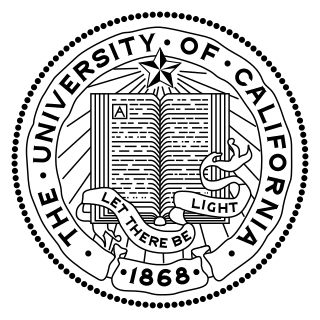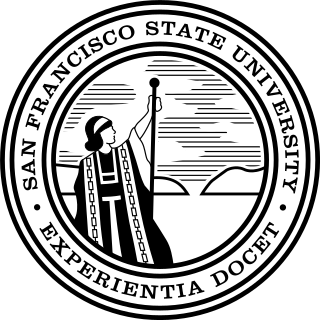This article may be in need of reorganization to comply with Wikipedia's layout guidelines .(January 2024) |
The College of Ethnic Studies at San Francisco State University was the first Ethnic studies college in the United States. [1]
This article may be in need of reorganization to comply with Wikipedia's layout guidelines .(January 2024) |
The College of Ethnic Studies at San Francisco State University was the first Ethnic studies college in the United States. [1]
In 1968, the Third World Liberation Front (TWLF) was created as a coalition of student groups at San Francisco State College (now San Francisco State University) and the University of California, Berkeley. The coalition opposed Eurocentrism in higher education and a lack of diversity.
In 1968 and 1969, the TWLF held the longest student strikes in American history at SF State College with the goal of having fifteen demands be met. [2]
The college was founded in Fall 1969 to meet a portion of the demands. [3]
In 2016, hundreds of students protested against budget cuts to the college and for the expansion of the college's programs. [4]
Until 2019, the college was the only College of Ethnic Studies in the United States. The second College of Ethnic Studies was established at California State University, Los Angeles. [5]

The University of California (UC) is a public land-grant research university system in the U.S. state of California. Headquartered in Oakland, the system is composed of its ten campuses at Berkeley, Davis, Irvine, Los Angeles, Merced, Riverside, San Diego, San Francisco, Santa Barbara, and Santa Cruz, along with numerous research centers and academic abroad centers. The system is the state's land-grant university. Major publications generally rank most UC campuses as being among the best universities in the world. In 1900, UC was one of the founders of the Association of American Universities and since the 1970s seven of its campuses, in addition to Berkeley, have been admitted to the association. Berkeley, Davis, Santa Cruz, Irvine, Los Angeles, Santa Barbara, and San Diego are considered Public Ivies, making California the state with the most universities in the nation to hold the title. UC campuses have large numbers of distinguished faculty in almost every academic discipline, with UC faculty and researchers having won 71 Nobel Prizes as of 2021.

The California State University is a public university system in California, and the largest public university system in the United States. It consists of 23 campuses and seven off-campus centers, which together enroll 457,992 students and employ 56,256 faculty and staff members. In California, it is one of the three public higher education systems, along with the University of California and the California Community Colleges systems. The CSU system is officially incorporated as The Trustees of the California State University, and is headquartered in Long Beach, California.

San Francisco State University is a public research university in San Francisco. It was established in 1899 as the San Francisco State Normal School and is part of the California State University system.

Samuel Ichiye Hayakawa was a Canadian-born American academic and politician of Japanese ancestry. A professor of English, he served as president of San Francisco State University and then as U.S. Senator from California from 1977 to 1983.

The University of California College of the Law, San Francisco is a public law school in San Francisco, California, United States. The law school was formerly known as the University of California, Hastings College of the Law from 1878 to 2023.

Proposition 209 is a California ballot proposition which, upon approval in November 1996, amended the state constitution to prohibit state governmental institutions from considering race, sex, or ethnicity, specifically in the areas of public employment, public contracting, and public education. Modeled on the Civil Rights Act of 1964, the California Civil Rights Initiative was authored by two California academics, Glynn Custred and Tom Wood. It was the first electoral test of affirmative action policies in North America. It passed with 55% in favor to 45% opposed, thereby banning affirmative action in the state's public sector.

Joseph Lawrence Alioto was an American politician who served as the 36th mayor of San Francisco, California, from 1968 to 1976.
Ethnic studies, in the United States, is the interdisciplinary study of difference—chiefly race, ethnicity, and nation, but also sexuality, gender, and other such markings—and power, as expressed by the state, by civil society, and by individuals.

City College of San Francisco is a public community college in San Francisco, California, United States. Founded as a junior college in 1935, the college plays an important local role, enrolling as many as one in nine San Francisco residents annually. CCSF is accredited by the Accrediting Commission for Community and Junior Colleges (ACCJC).
Asian American Studies is an academic field originating in the 1960s, which critically examines the history, issues, sociology, religion, experiences, culture, and policies relevant to Asian Americans. It is closely related to other Ethnic Studies fields, such as African American Studies, Latino Studies, and Native American Studies.
Malaquías Montoya is an American-born Chicano poster artist who is known as a major figure in the Chicano Art Movement of the 1960s and 1970s.
The Third World Liberation Front (TWLF) rose in 1968 as a coalition of ethnic student groups on college campuses in California in response to the Eurocentric education and lack of diversity at San Francisco State College and University of California, Berkeley. The TWLF was instrumental in creating and establishing Ethnic Studies and other identity studies as majors in their respective schools and universities across the United States.
In 1968, the Third World Liberation Front (TWLF), a coalition of the Black Students Union, the Latin American Students Organization, the Filipino American Collegiate Endeavor (PACE) the Filipino-American Students Organization, the Asian American Political Alliance, and El Renacimiento, a Mexican-American student organization, formed at San Francisco State University (SFSU) to call for campus reform. Another Third World Liberation Front was formed at University of California, Berkeley in January 1969. These coalitions initiated and sustained the Third World Liberation Front strikes of 1968, one of the longest student strikes in US history.
The Asian American Political Alliance (AAPA) was a political organization started at University of California, Berkeley in 1968 that aimed to unite all Asian Americans under one identity to push for political and social action. The two main chapters were at UC Berkeley, and San Francisco State College, both of which became heavily involved in the larger Asian American movement throughout the 1960s, including at the Third World Liberation Front strikes at SF State and at UC Berkeley. The AAPA identified as an anti-imperialistic, Third World political organization that fought for self-determination and liberation for Asian Americans. They expressed solidarity and support for other people of color throughout the US and throughout the world, particularly in colonized or recently decolonized countries. The AAPA's participation in the Third World Liberation Front strikes at SF State and UC Berkeley resulted in the creation of a School of Ethnic Studies at SF State and an Ethnic Studies department at UC Berkeley. The AAPA was also involved in movements such as the Black Power Movement and the anti-Vietnam War movement. Although both main chapters were short-lived and disbanded in 1969, the AAPA played a large role in the Asian American movement and was influential in encouraging other Asian Americans to get involved in political action.
The Intercollegiate Chinese for Social Action (ICSA) was a student organization formed in 1967 at San Francisco State College. The group organized various community-oriented events and service projects, particularly in the Chinatown community in San Francisco. In 1968, the ICSA joined the Third World Liberation Front (TWLF), a coalition of different student groups advocating for campus reform at SFSU. The ICSA also actively protested traditional Chinese leadership, in particular the Six Companies in San Francisco.
Juanita Tamayo Lott is a Filipina-American author and activist. A chronicler of the Filipino experience in America, Lott has authored several popular and scholarly works on Asian Americans. She has also contributed to the establishment of several Asian American studies departments. As a college student in 1969, Lott co-founded the first U.S. Filipino American Studies Program at San Francisco State; in 2007, she developed the Filipino American Studies Program at the University of Maryland, College Park. Trained as a statistician and demographer, she spent her career as a policy analyst for the federal government.
The University of California, Los Angeles Asian American Studies Center (AASC) is an organization that educates students and the general public about the history of Asian American and Pacific Islanders and their experiences. The AASC is one of the leading and groundbreaking organizations to have substantial and credible resources for their research. Located in Campbell Hall, the AASC quickly became a center for resource-gathering and scholarship for the Asian American movement. Asian American student organizations at CSULA, Occidental, USC, and other colleges soon followed. It was a vital hub and training ground for young activists, a place where they could earn a salary while doing community work.
Rupert García is an American Chicano visual artist and professor. He is known as a painter, pastellist, and screen printer. In the 1960s, as a leader, he led a movement against 'Yankee' culture through the production and use of posters, and screen prints. In 1970, he co-founded the Galería de la Raza in San Francisco.
The history of San Francisco State University began in 1857, with a teacher-training program at a high school, which led to the creation of San Francisco State Normal School. It became San Francisco State Teachers College, San Francisco State College, and California State University, San Francisco before becoming San Francisco State University as it's known today.

Laureen Chew is an American academic and actress. She is Professor Emerita of Asian American studies at San Francisco State University. She acted in two Wayne Wang films in the 1980s, both of which were shot in San Francisco.